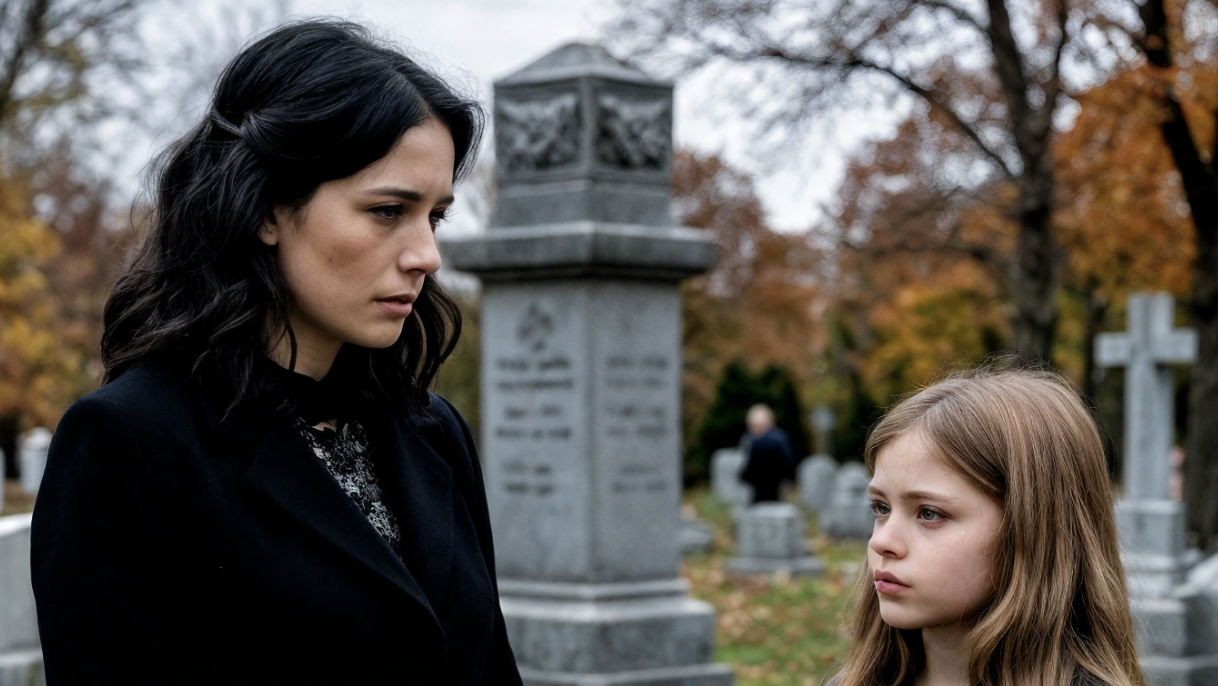Three years have passed since the day pain stormed into Irina’s life—not just any pain, but the loss of everything that made her life worth living. In an instant, like a snapped cable over an abyss, she was deprived of the two closest people: her husband Oleg and their little son Timur.
At first glance, nothing foretold disaster. The morning was ordinary—cool, quiet, with a light mist of fog outside the window. Oleg, as usual on weekends, was preparing to go fishing. It wasn’t just a hobby — more like a ritual, a way to escape the hustle, clear his mind, sit in silence with a fishing rod, and think. He even joked sometimes: “I’m at the bay like at confession — without sins and with a clear conscience.”
Sometimes he came back with a rich catch—proudly dumping the fish on the table like trophies. Irina would just sigh, roll her eyes, and silently start preparing freezer bags. She knew who she married—a man whose soul was tied to the waters. But even she liked how her husband’s eyes sparkled when he talked about his favorite place—the Quiet Bay, where the water mirrored the sky, and the air was filled with the scent of pine and birdsong.
She herself had gone with them a couple of times but couldn’t stand it long—mosquitoes ruined all the fun. Still, she admitted:
— The place is beautiful… but only for two hours. Beyond that — it’s hell.
But Timur adored that place. Since he was five, he literally begged to go fishing, like other kids begged to go to an amusement park. He ran along the shore, proudly waving his toy fishing rod, imagining himself a great fisherman. His laughter echoed over the water, and his eyes shone as if the whole summer glowed inside them.
That day started like any other. Oleg tried to dissuade his son—it was early, cold, and the mosquitoes were attacking again. But Timur pouted, grew sad, and his eyes flashed with hurt disappointment. Irina looked at him—her heart clenched. After all, her son was her living reflection: the same blue eyes, the same long eyelashes that drew admiring exclamations from everyone: “Like a girl!” They say if a boy looks like his mother, it’s good luck. How could she refuse him?
— Alright, — she said firmly. — But not a step away from your dad. Not a foot in the water. — I promise! — Timur shouted joyfully, as if he’d won a grand prize. — A fisherman is growing up, — Oleg smiled, kissing his wife on the temple.
Early in the morning, while it was still dark outside, Irina saw them off to the car. She wished them a good fishing trip, straightened her son’s jacket collar, and stood by the entrance until the car disappeared from sight. Yawning, she returned home and lay down again—it was only six o’clock.
The call came suddenly, like thunder out of a clear sky. Half asleep, she picked up the phone, seeing Oleg’s name.
— Strange… He should already be at the bay. What happened? — she thought.
But the voice on the other end was strange. Unknown. Male. At first, Irina thought it was some nightmare. But the nightmare didn’t end. Then — chaos, a taxi, a frantic race to the morgue, tears, prayers, screams: if only it was a mistake…
A miracle did not happen. There was no mistake. Oleg and Timur died on the way to their beloved place. At the exit from Berezovsk, their car was hit by a truck that had veered into the oncoming lane. The driver was drunk. They had no chance. Life ended in an instant.
The days after felt like a fog. The funeral, sorrowful faces of relatives, friends who took everything into their hands. They kept Irina afloat when she no longer understood why to live. But one morning came when everyone left, and she was left alone. Completely alone. In the house in the Southern neighborhood, where every object reminded her of those who were no longer there. Where every thing, every photograph, every corner whispered: “You let them go.”
Thoughts tormented her, guilt suffocated her. She blamed herself for letting the child go. She was angry at her husband for not insisting, for not stopping, for not dodging fate. She wanted to scream, cry, curse — but in the end, she just howled. Like a mother who lost her little ones. Like a woman who needed no one anymore.
The only thing that kept her from drowning in pain was work. She clung to it like a drowning person to a dam. Morning — office, evening — the way home if she had strength. More often she just wandered the city: looked at shop windows, sat on benches, stared at the sky until sleepiness came. Only then, exhausted, she returned to her apartment near the “Central” station, where cold walls and eternal silence did not wait, did not warm — they just were.
Every night was a new battle. Every day — a repetition of the same nightmare. She sat on the edge of the bed, buried her face in the pillow, and cried — silently, with a bitter lump in her throat. Such nights seemed endless.
No one knows how it would have ended if not for Lena. Her longtime friend who didn’t disappear, didn’t say banal things like “everything will be alright.” One day she said plainly:
— Ira, enough. You can’t keep living in this grave. Sell the apartment. Move somewhere. Maybe it will get easier.
— Are you serious? — Irina asked, shocked.
— Yes. I want you to get out. And the things… — Lena hesitated — Timur and Oleg’s things… maybe it’s time to give them away? At least put them away.
Irina flared up:
— You want me to throw away my son’s clothes? His toys? His drawings?! Do you even understand what you’re asking?!
Lena thought.
— Okay. Then let’s take everything to the dacha. Let it be there. Just don’t let it be near you every day. A compromise?
Irina agreed. Not immediately. Through tears, through inner protest. But she agreed. And it really became a little easier—just a little. The pain didn’t disappear but became a background. A shadow that doesn’t press down but simply reminds.
Three years passed. Irina didn’t laugh. Didn’t live. Just existed. Like a robot. Got up, washed, went to work. Came back, mechanically swallowed food, stared at the wall. All feelings died with her husband and son. She stayed there—in that day when everything was destroyed. Endless, mute, merciless.
Yes, the new apartment was closer to work—only ten minutes on foot. But it didn’t bring Irina any comfort. She didn’t even notice the difference. But the road to the cemetery became longer. Much longer. Yet that’s where she went almost every week—as to a sacred ritual.
Her friend sighed, her parents begged:
— Ira, you’re ruining yourself.
— Let go of the pain, — Lena said.
But Irina didn’t listen. Every Sunday—new flowers, soft toys, candies. She bought them with one thought: “Let them know I was here.” First by metro, then by bus—a long trip, like a trial she had to endure.
And again, on one of those mornings, Irina got off slowly at the final stop, as if reluctantly. The cemetery gatekeeper had long recognized her, nodded briefly:
— Hello.
— Good day, — she replied, walking on, clutching a big plush rabbit to her chest.
She stopped at her husband’s grave for only a moment, as if asking forgiveness for spending so little time there. Then she went to the children’s plot, decorated with a white stone angel. She knelt, carefully straightened the flowers, placed the new rabbit next to the other toys. Then she simply sat on the ground, hugging her knees.
— Son… — she whispered, running her fingers over the cold earth. — My little one… without you everything has lost its meaning… I’m so scared and so lonely…
Tears flowed on their own—hot, silent. She raised her face to the sky, as if addressing God Himself:
— Lord… why did you leave me? Why?.. For what?.. Take me too… I can’t anymore…
Her heart was torn by pain, her chest unbearably tight. A lark circled overhead, its cry so piercing it seemed it was crying with her.
Time passed—Irina didn’t know how much. She sat motionless until suddenly she heard a quiet child’s cry. It came very close—from behind the lilac bushes. A thin, trembling child’s voice.
She cautiously approached. Behind the bush, right on the ground, sat a girl about seven years old. Blonde, thin, all dusty. Her face hidden in her hands. Sobbing, she repeated:
— Mommy… take me with you… I don’t want to be with daddy anymore… I feel bad…
Irina clenched inside but gently touched the child’s shoulder. She startled, lifted her eyes. Their gazes met. The girl had the same bottomless blue eyes framed by dark lashes as Timur. That look struck straight to the heart.
— Hi… — Irina said softly, trying to smile. — Are you alone?
— Yes… I came to my mom, — whispered the girl.
— What’s your name, little one?
— Mila…
— How did you get here alone?
— I live nearby… But dad changed. After mom, he started drinking. He doesn’t hit me… but I’m scared.
Irina’s heart clenched. Before her was a child—frightened, lost, but so alive. Her own pain receded for a while, giving way to something new.
— Come with me. You shouldn’t be alone among graves.
Mila trustingly put her hand in the stranger’s. At the gate, the caretaker noticed them:
— You’re here again, Mila? We already warned you, took you home. But she slips away often.
— I just missed mom… — the girl pouted.
— We’ll sort it out, — Irina nodded shortly and pulled her along.
Outside, Mila spoke quietly but confidently:
— Just don’t send me to an orphanage. I don’t want to go there. Dad isn’t mean, just… he feels bad. He’s sad.
Irina bent down, hugged the girl’s shoulders:
— Don’t worry. I won’t give you away anywhere. Now we’ll go to a café—eat something, then decide what to do next. Are you hungry?
Mila nodded, swallowing her hunger:
— Very…
They entered a cozy café “Veranda”—bright, with the smell of cinnamon and soft jazz music playing. Irina ordered soup, pasta with cutlets, fruit juice, and later, ice cream with whipped cream for the girl.
She watched how Mila ate carefully, how she gently put down the glass, how diligently she scooped the last pieces with her spoon. When the dessert was over, the girl spoke:
— I’m six years old. Next year I’ll go to school.
— Oh really! And which one? — Irina asked, trying to sound light.
— I don’t know… Dad promised to find out. Before, he worked at a big company. But after mom everything changed. He now sits at home, smokes, does nothing.
Irina listened attentively, not interrupting.
— We live nearby, just five stops away. Sometimes I walk. They don’t let me on the bus alone. They threaten to call the police. Then I run away…
Irina’s heart clenched. People saw this girl—saw!—walking alone, crying at the graves, but instead of help—only threats. Someone should have stopped earlier. But that someone turned out to be her.
— Alright, — said Irina. — Let’s go to your home. Let’s see how things are there.
Mila nodded, but tension was obvious in her shoulders. She cautiously added:
— Just please… don’t call the police.
— I won’t, — promised Irina. — I promise.
They left, got on the bus. In a few minutes they arrived at an old two-story house with a crooked sign and wrought-iron gate. Once neat yard now overgrown, grass sprouting through the pavement tiles, gazebo hidden under ivy.
— We used to have a maid and a gardener, — Mila said, as if justifying herself. — But then dad fired them all. Said he had no strength left.
Irina sighed. Everything around screamed of former prosperity. Of a family that once laughed, loved, made plans. Now the house looked more like an abandoned lighthouse than a cozy family nest.
They went inside. First hit was a sharp smell—a mix of booze breath, mustiness, and unwashed dishes. In the living room, a man stretched out on the sofa. Unshaven face, sunken cheeks, empty bottle in hand. He wasn’t asleep—just stared at the ceiling, as if looking for answers to all his torments there.
— Dad… wake up… — Mila gently poked her father’s shoulder. — Daddy… please…
The man muttered something unintelligible, didn’t open his eyes, didn’t move. Irina hesitated at the doorway, not knowing what to say. But everything became clear when the girl curled up in the corner of the armchair and started crying—quietly, childishly, with sobs that tore the heart.
Leaving her there—Irina couldn’t. And she didn’t want to call the police yet. Not now.
— Get ready. You’re coming with me, — she said firmly, like a person who had already made a decision.
— And dad?.. — Mila asked fearfully, raising her eyes. Tears stood in them, and deep inside—a familiar fear. Blue like spring sky. Like Timur’s.
Irina’s heart trembled.
— He’ll wake up. And come for you, — she promised, though she didn’t know what she believed more—the promise or hope. She wrote her address and phone number on a scrap of paper and placed it next to the bottle. At least some trace, something.
Outside, Mila perked up a little. They walked silently, holding hands, but suddenly the girl spoke—lightly, almost joyfully. With this woman, with this “aunt,” it was calm. Safe. Real.
At home, Irina for the first time in a long time felt like cooking. She took out groceries, rolled out dough, put pizza in the oven. Cooked borscht—just like Timur liked. Then she and Mila went to the store, bought everything: chips, chocolates, soda—everything usually bought only on holidays.
— Sometimes it’s allowed, — Irina winked.
— Yes! — Mila laughed. — And you don’t even have to brush your teeth!
They laughed. Laughed like they hadn’t for a long time.
Then—a bath with foam, clean pajamas, warm blanket, and a book before bed. Irina read a fairy tale about the buzzing fly, and Mila lay beside her, cuddled up.
— Did you have a son? — the girl suddenly asked.
— Yes. His name was Timur. Now he’s in heaven.
— My mom is there too… — sighed Mila. — Maybe they’re happy together?
— I think so. And we’re here. Time to sleep, dear.
— Okay… — the girl answered sleepily, burying her face in the pillow.
Irina watched her for a long time until she fell asleep. Turned off the light, lay down next to her. She dreamed of Timur. And Oleg. They were walking in the park, laughing, eating ice cream. Timur laughed happily.
She woke up to a phone call.
The dream dissipated. Reality returned—sharp, merciless. A man’s voice broke through the silence of the room, full of rage and fear:
— Who is this?! Did you take my daughter?!
— Who are you? — Irina asked, trying to stay calm.
— Sergey! Her father! Where is she?!
— She’s sleeping. But where were you—that’s the question.
She went to the kitchen so as not to wake Mila.
— Listen, — she continued more quietly, — your daughter was alone. At the cemetery. Doesn’t that worry you?
— I… — the voice on the other end faltered. — Please, don’t call the police. I’m coming now.
— Okay. I’m waiting, — Irina said shortly and hung up.
Suddenly she felt some strange impulse inside—not exactly strength, but movement. Something began to shift. She opened the cupboard, took out a frying pan. Decided: today would be pancakes. The very ones Timur loved so much. Maybe Mila would like them too.
Half an hour later, the apartment filled with a homey, sweet aroma—like from childhood. The first rays of sun peeked through the window. And for the first time in three years, Irina felt it—inside, it was getting a little warmer.
The doorbell interrupted the morning silence. Irina opened—it was a man. Tall, with clear eyes, a little worn out, but no longer the man who had collapsed helplessly the day before. Now he was clean-shaven, neatly dressed—a fresh shirt, though with a hint of hangover fatigue. He still looked broken, but there was an attempt to pull himself together—to be a father again.
— I’m… Sergey. We talked on the phone. You seem to have my daughter… — he said timidly, as if afraid to hear “no.”
Irina looked at him for a long time, recalling the man from yesterday, lost in his grief. But now before her was someone else—alive, trying to come back to life. She silently stepped aside, letting him in.
At the kitchen table, where in the morning it smelled of honey and pancakes, they sat facing each other. Irina put a cup of tea in front of him and began to tell calmly, without anger but with utmost honesty. About how she found Mila at the cemetery. How the girl cried lying on her mother’s grave. How she feared the police, begged not to be taken to the orphanage.
Sergey listened, head bowed. Irina’s words fell like raindrops—heavy, cold, truthful.
Finally he spoke:
— We used to have a good life. Katya… my wife… she was an amazing woman. Kind, smart, beautiful. And Mila… our light. I worked at a big company, salary was good. Built a house, bought a car. Everyone envied us…
He faltered, swallowed as if the words began to fail him.
— Then everything collapsed. One day Katya just fainted. Taken to hospital, tests started… and like a blow—stage three cancer. Without pain, without symptoms. Just… suddenly. And when they found out—it was too late. No connections, no money helped. She left… so suddenly, as if she was never here.
His voice became hoarse, full of pain:
— I thought my life was over too. I started drinking to feel nothing. Even just to pass out for a bit. At work, they tolerated me… but I… I just didn’t know how to stop. And I told myself: Mila is little, she understands nothing. She’s at kindergarten, sleeps at home… But it turns out…
— Turns out she wanders the cemetery, Sergey, — Irina interrupted, her voice harder than she wanted. — And no one notices. Neither you nor the neighbors. Drivers chase her away, and she walks. A six-year-old child!
— I… didn’t know, — he whispered. — When she wasn’t home today, it felt like my heart was ripped out. If anything happened to her… I wouldn’t survive.
Silence hung.
At that moment, the door to the room gently opened, and Mila appeared in the doorway. Disheveled, in Irina’s large T-shirt, sleepy but smiling.
— Dad? — she raised her eyebrows in surprise.
— Hello, sunshine, — Sergey replied, opening his arms. — I just arrived. Come to me.
Mila ran to him, wrapped her arms around his neck:
— Daddy, I love you so much… I just feel really bad when you’re like that…
— Forgive me, daughter… — he whispered, holding her tightly. — I promise I won’t be ‘like that’ anymore. I promise you…
Irina stood nearby, watching the scene. Something inside her trembled—memories, pain, images. But now it wasn’t destructive. It was more like a light echo—reverberations of the past that no longer pull down.
— Time for breakfast, — she finally said. — The tea is still warm.
— We probably kept you… — Sergey began awkwardly. — You have work, right?
— I took a day off, — Irina replied calmly. — So drink tea, don’t rush.
— Can I stay? — Mila asked anxiously.
— Yes, — Irina repeated with a slight smile. — Stay.
— Then… thank you, — Sergey said, smiling shyly.
— Sit down everyone. The pancakes are still warm. Let’s have breakfast.
— Hooray! Pancakes! — Mila shouted joyfully.
— I love them too, — Sergey admitted like a child.
They sat at the table. Breakfast was simple but incredibly warm. They talked, laughed, drank tea. Outside the window, there was no autumn, no pain, no heavy memories—only an ordinary morning, one worth living.
Weeks passed. Months. Irina and Sergey met more often. Mila sometimes stayed over for weekends—and with each day she grew brighter, more cheerful. Sergey really quit drinking. Returned to work, order, and to his daughter.
Irina went to the cemetery less often. Not because she forgot. But because she learned to live on—for Mila, for herself, and even—why not—for something new.
She and Sergey slowly grew closer. No loud confessions, no rush. They simply found themselves nearby. Almost a family. And somewhere high, beyond the clouds or in the memory of those no longer here, eyes shone. Those who can’t be returned. But can be cherished through love, care, and the ability to let go of pain to give others a chance at happiness.
Because sometimes love is not holding on to the past, but giving the future a chance.



